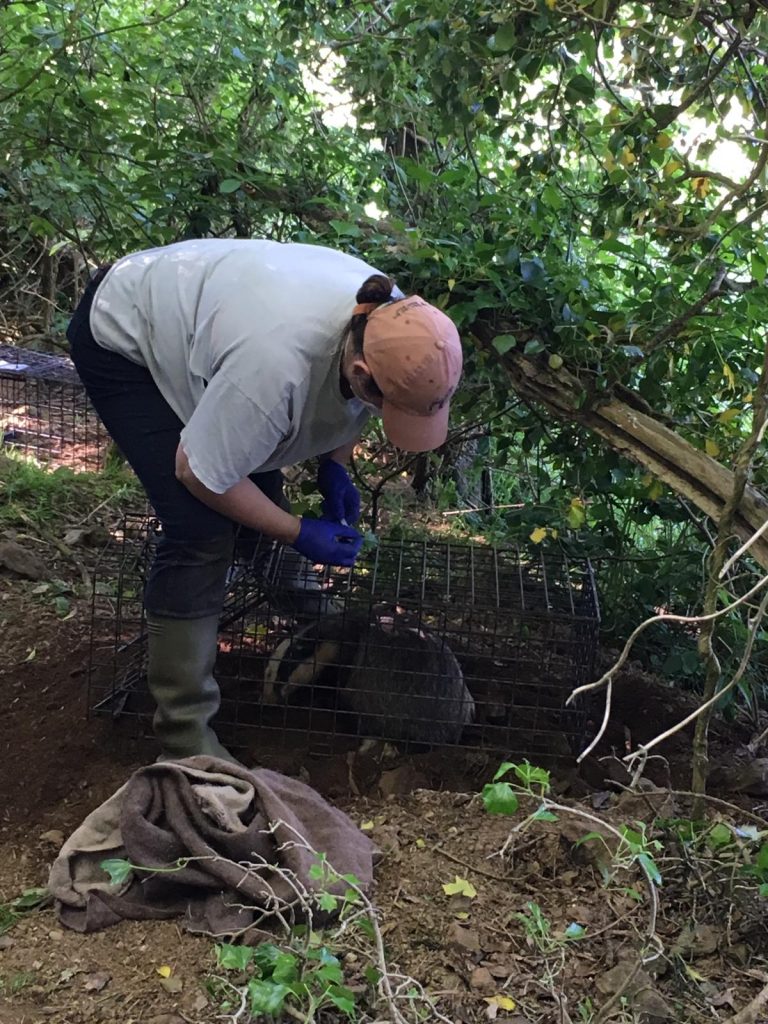I hate asking people for money.
I recall a lunch years ago in San Francisco, when a conservation organisation introduced me to a potential donor. I talked enthusiastically about my work with African wild dogs. I explained the plight of the species and how our work was designed to stop it from going extinct. I told amusing stories from the field. I hinted at the difficulties of supporting the work. But I just couldn’t bring myself to do “the ask”. So I came away empty handed.
I’m asking now.
I still feel bad about it.
So, here I want to explain why I’m asking readers like you to support a project.
The project in question is the Cornwall Badger Project. We do research on the transmission of bovine tuberculosis (TB) between badgers and cattle, which at the moment focuses on evaluating badger vaccination as a way to reduce TB levels in badgers and hence risks to cattle. The project involves “learning by doing”: we vaccinate many badgers each year and, in the process, evaluate how TB rates change. You can see a quick summary in this film.

Who should fund this badger vaccination work? Let me explain who benefits from it, and why each of them is reluctant, or unable, to fund it at the present time.
Farmers
If our project shows what we expect, then the main beneficiaries will be farmers. Less TB would mean a lower risk of economic losses, and fewer nights of lost sleep worrying about TB testing. But farmers are understandably sceptical. The National Farmers Union campaigned for years for the current coast-to-coast badger cull, and they are resistant to anything which might threaten its integrity. If the farming press considers badger vaccination at all, it tends to present it as a namby-pamby approach from a bunch of bunny-huggers which can never be as effective as a “tough” approach like culling. This is akin to the assumption that medicines can only work if they taste nasty – i.e., completely without evidence. Challenging this assumption, and convincing farmers to consider vaccination, demands evidence that it will work to protect cattle. That evidence has to come from somewhere – but it’s a stretch to ask farmers to pay for it. After all it was, government, not farmers, who paid to evaluate badger culling.
Government
That brings us to government. In the past, the government had little interest in badger vaccination – for example in 2018 the amount it spent on vaccination was one-thirtieth the amount it spent on culling. Its focus until recently was the “Edge” area where TB prevalence in badgers is thought to be low. However, our work demands work where TB prevalence is high: it’s much easier to detect a reduction from (say) 10% to 2% than a reduction from 1% to 0.2%. So, we have had much less support from government than other vaccination projects.
But these days, the government has an updated strategy to eradicate TB from England, in which it has committed “to support badger vaccination in areas where there is a reservoir of infection in badgers but farmers have decided not to cull” and to “help to deliver injectable badger vaccination in all areas that have completed an intensive cull and carry out surveillance in the badger population to inform future decisions on disease management”. So there’s hope that the government may support the project in time. But its implementation of this strategy has been slow – perhaps delayed by the covid pandemic – and it’s unlikely to help us in the short term.
Wildlife Groups
This is where most of our funding has come from in the past. Most wildlife groups have no specific remit for controlling TB (TB itself is not a threat to badger populations, and infected badgers probably seldom suffer as a result of their infection). However, they tend to want to see wildlife conserved, and treated humanely, and the badger cull does neither of these things. Still, badgers are not (yet) a major conservation priority – which can make it difficult to spend conservation funds on vaccinating badgers.
Overall, while everyone would benefit from better evidence on how well badger vaccination works to reduce TB transmission, everyone (with the possible exception of government) can make a case that someone else should be paying to generate that evidence. Meanwhile, badger vaccination and sampling are skilled tasks which can only be accomplished by fully trained and licensed staff. Retaining such staff needs consistent funding.
The covid pandemic impacted us badly. In the spring, we didn’t know if we were going to be able to deliver any vaccination at all – so we couldn’t ask funders to pay for it. As it became clear that some sort of vaccination season would be possible (and, indeed, required by our licences), funds we had been expecting were withdrawn or delayed indefinitely. Now we have hit a wall: we need funds to keep the project going, and we need them now.
That’s why we’re crowdfunding. We hope that the people who agree with what we’re doing will help to support what we’re doing. We hope that their – your – £5s and £20s and £50s will build up to make a fund big enough to see us to the end of the season. Without it, the project will have to end, and the years of hard work to get to this point will be wasted.
These are hard times for everyone – but anything you can afford will help the project to keep going.
To support us, visit https://www.crowdfunder.co.uk/cornwall-badger-project.
Thankyou!!
